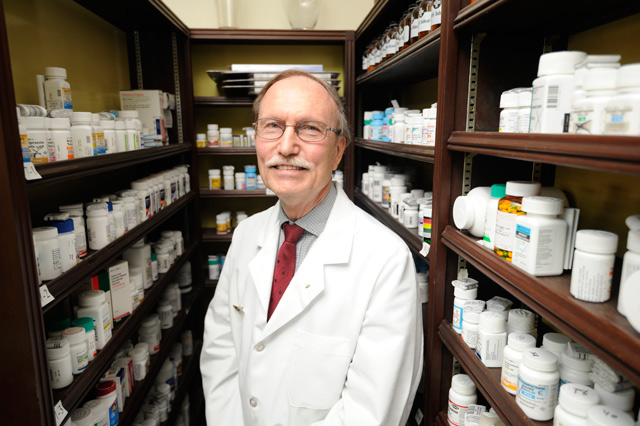Pharmacy Tied to ‘Candy Man’ Closes
State Accuses L.M. Caldwell Pharmacist of Oversupplying Powerful Painkillers

After 70 years as a Santa Barbara staple, L.M. Caldwell Pharmacist is shutting its doors this week after the state’s Board of Pharmacy accused the company of routinely oversupplying powerful painkillers.
Since taking over his father’s business in 1967, Peter Caldwell has run two shops on State and Pueblo streets. They were some of the last of the remaining few mom-and-pop pharmacies in Santa Barbara, all of which have struggled to compete with CVS and Rite Aid. Sources in the industry said privately that this financial reality drove some independent pharmacists to regularly fill questionable opioid prescriptions at a time when overprescribing was rampant here and across the country.
After Dr. Julio “Candy Man” Diaz was arrested in January 2012 and then sentenced in 2015 to 27 years in prison for overprescribing opioids to countless patients, which authorities believe resulted in multiple overdose deaths, regulators found many of Diaz’s patients regularly picked up their pills from Caldwell Pharmacist.
These patients “habitually engaged in doctor shopping” and went to multiple different pharmacies, the accusation states. Several patients drove upward of 40 miles and paid mostly in cash. For instance, one Lompoc man spent $2,500 for 60 milligrams of Oxycontin. Another patient, who was from Ventura, received 1,200 tablets of minor pain relievers within a month.
In addition, the complaint said, many patients had irregular patterns for picking up their prescriptions or returning too frequently for refills. The pharmacists failed to validate prescriptions by accessing CURES (Controlled Substance Utilization Review and Evaluation System) to search patients’ drug histories. “A review of CURES and their own records would have been a red flag,” the allegation reads. Investigators also found sloppy or nonexistent records; more than 134,000 pills were unaccounted for. In addition, a technician at Caldwell pleaded guilty in 2011 to stealing Oxycontin from the pharmacy and selling the drugs to an undercover detective. (Caldwell was forced to pay $15,000 for the state’s investiation.)
Investigators reprimanded Caldwell and his pharmacist Abdul Yahyavi for failing to question the “Candy Man’s” prescriptions, given his reputation. In two years, emergency room doctors at Cottage Hospital had counted more than 400 patients who came through their doors after overdosing on drugs prescribed by Diaz.
In an interview last week, Peter Caldwell declined to directly address the Board of Pharmacy’s accusations but spoke more generally about the nexus between the pharmaceutical industry and the swelling opioid epidemic. “It took the authorities a long time to get their act together, and they still don’t have it together,” he said.
While Caldwell claimed “every store in town was affected” by Diaz’s overprescribing, investigators found his Pueblo Street location “filled tens of thousands more controlled substances prescribed by Dr. Diaz when compared to neighboring pharmacies” in a two-year time frame. In 2012, years after Diaz was well known to run a pill mill, Caldwell was still filling prescriptions for his patients — 12 percent of his total opioid orders — whereas Federal Drug and Rite Aid declined to do so.
“Statistics are statistics,” Caldwell said. “I suspect the independent pharmacies in town filled more prescriptions than the chain stores did in that particular time. Percentagewise, it is possible.”
Other independent pharmacies in town have faced similar scrutiny in various civil lawsuits, but the findings have not been so damning. Dr. Chris Flynn, an emergency room doctor at Cottage Hospital who convened an opioid task force, claimed Caldwell Pharmacist “violated patient safety standards” by continuing to fill dangerous prescriptions written by Diaz despite overwhelming concern by other pharmacy professionals.
But Caldwell lamented that CURES was “inoperable” eight years ago. “I wish it would have worked when they brought it out,” he said. He spoke about the difficult “judgment calls” pharmacists must make. Moreover, he said pharmacists were “mostly left out of the loop when something became apparent to law enforcement. And it’s been an ongoing challenge to bring us up to the front line,” he said. “The focus should be on improving the system, not [whom] can we penalize. It’s like waiting for the person to die at an intersection before you put up a stop sign,” he said.
Caldwell said he knew Diaz, who is 68, but he declined to pass judgment on the once-beloved doctor who will likely spend the rest of his life in prison. “I’m not here to single out any one person or condemn somebody for what they did or didn’t do,” he said. “My closing the pharmacy is retiring, and that is just what it is. This is not anything that I am losing sleep over.”



